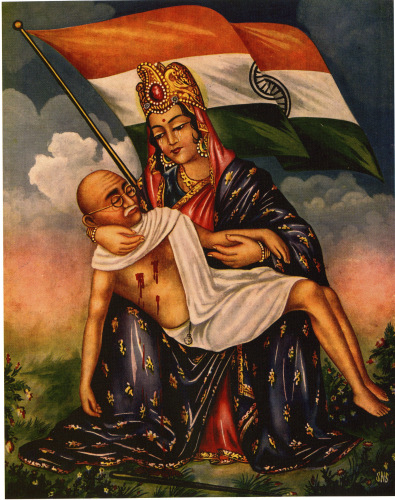The Gandhi Everyone Loves to Hate
by Vinay Lal

Indian folk art representation of Gandhi’s assassination; courtesy Vinay Lal collection
Uniquely among the major public figures of the modern world, Mohandas Gandhi attracted an extraordinarily wide and diverse following and, perhaps oddly for someone who is customarily thought of in terms of veneration, an equally if not more diverse array of often relentlessly hostile critics. (1) The first part of this story is better known than the latter part of the narrative around which this paper is framed, (2) though much remains to be understood about the manner in which Gandhi, notwithstanding his rather strident views on modernity, industrial civilisation, materialism, sexual relations, indeed on everything that is ordinarily encompassed under the rubric of social and political life, drew to himself people from very different walks of life.
Among his most intimate disciples, who, it is no exaggeration to say, surrendered their life to the Mahatma, one thinks of the daughter of an English admiral, raised on the music of Beethoven in the lap of luxury and immense privilege; a Tamil Christian, trained as an accountant and economist, who was among the first Indians to earn a degree in business administration; a Gujarati villager, son of a schoolteacher, who was embraced by Gandhi when they first met in 1917 as something like a long-lost son; and an Anglican clergyman, arriving in India from Britain on what was destined to become a one-way ticket, who came to the realization that Gandhi was a better Christian than many who call themselves Christians. (3)
Read the pdf of the complete article here: The Gandhi Everyone Loves to Hate
EDITOR’S NOTE: Vinay Lal is Professor of History and Asian American Studies at UCLA. He writes widely on the history and culture of colonial and modern India, popular and public culture in India (especially cinema), historiography, the politics of world history, the Indian diaspora, global politics, contemporary American politics, and the life and thought of Mohandas Gandhi. He is the author or editor of over fifteen books. His exceptional blog site gives a full biography, and list of his publications. It is regularly updated with a wealth of articles on India and Gandhi. His author’s page lists other of his articles, which we have posted.




